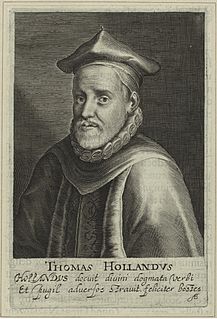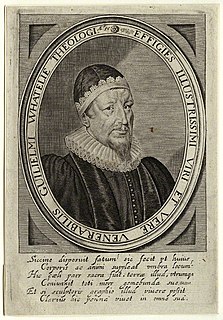Related Research Articles

Samuel Harsnett, born Samuel Halsnoth, was an English writer on religion and Archbishop of York from 1629.
Richard Senhouse was an English churchman, Bishop of Carlisle from 1624 to 1626.
Richard Field (1561–1616) was an English ecclesiological theologian associated with the work of Richard Hooker. Whereas Hooker, eight years Field's senior, had written his Lawes of Ecclesiastical Polity to defend conformity against non-conformity, Field's major work, Of the Church (1606/10), was a defence of the Protestant Church of England under its Elizabethan settlement against the charge of Romanist opponents that it was no church at all.

Thomas Holland was an English Calvinist scholar and theologian, and one of the translators of the King James Version of the Bible.

Sir Francis Moore was a prominent Jacobean barrister and Member of Parliament.
Charles Amyand Harris (1813–1874) was a priest in the Church of England and Bishop of Gibraltar.
Sir Nathaniel Bacon, of Stiffkey in Norfolk, was an English lawyer and Member of Parliament (MP).
Meredith Hanmer (1543–1604) was a Welsh clergyman, known as a controversialist, historian, and translator. He was considered embittered, by the Lord-Deputy William Russell, 1st Baron Russell of Thornhaugh; but he appears now as a shrewd observer of the Protestant and nonconformist life of Ireland as founded around Trinity College, Dublin.
William Thorne was an English clergyman and orientalist, Regius Professor of Hebrew at Oxford in 1598.
Thomas Westfield was an English churchman, Bishop of Bristol and member of the Westminster Assembly.
Richard Forster (c.1546–1616) was an English physician.

Richard Edes (1555–1604) was an English churchman. He became Dean of Worcester, and was nominated one of the translators for the Authorised King James Version, in the Second Oxford Company, but died in the earliest stages of the project.
Leonard Hutten (1557?–1632) was an English clergyman and antiquary.
Roger Fenton (1565–1615) was an English clergyman, one of the translators of the Authorised King James Version.
Edward Grant was an English classical scholar, Latin poet, and headmaster of Westminster School. He was also the first biographer of Roger Ascham.
John Chardon was an Englishman who became the Church of Ireland bishop of Down and Connor from 1596 to 1601.
Martin Culpepper was an English clergyman, medical doctor, and academic at the University of Oxford.

Sir John Thynne of Longleat House, Wiltshire, was an English landowner and Member of Parliament.

Sir Roger Owen was an English Member of Parliament. He was the eldest son of Thomas Owen of Condover, Shropshire and was educated at Shrewsbury School (1583) and Christ Church, Oxford. He trained for the law at Lincoln's Inn (1589) and was called to the bar in 1597. In 1598 he succeeded his father, who had built Condover Hall for him, and was knighted in 1604.

William Whately (1583–1639) was an English Puritan cleric and author.
References
![]() This article incorporates text from a publication now in the public domain : "Evans, Edward (fl.1615)". Dictionary of National Biography . London: Smith, Elder & Co. 1885–1900.
This article incorporates text from a publication now in the public domain : "Evans, Edward (fl.1615)". Dictionary of National Biography . London: Smith, Elder & Co. 1885–1900.